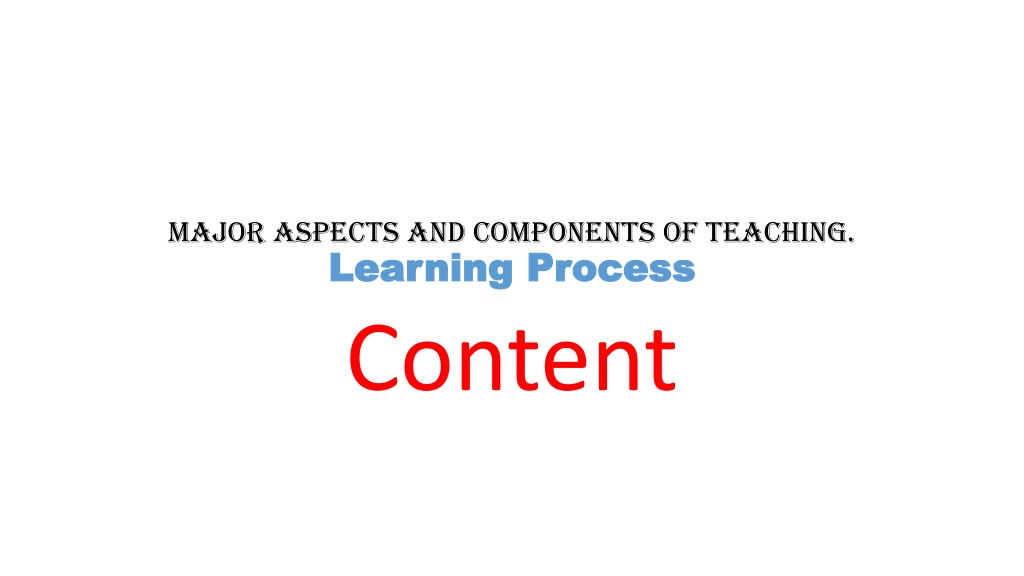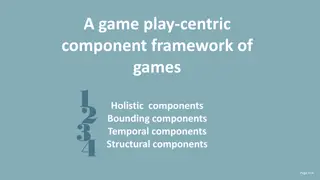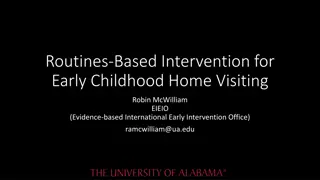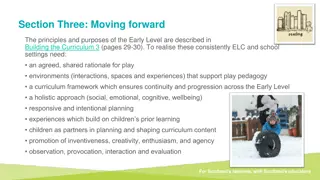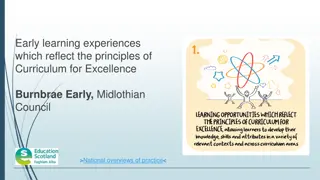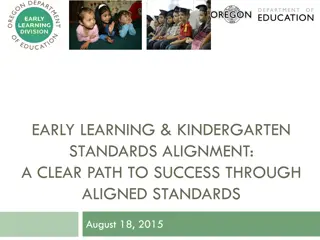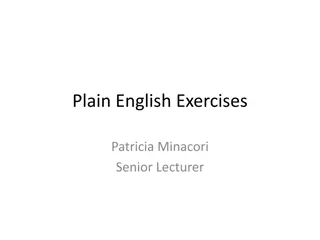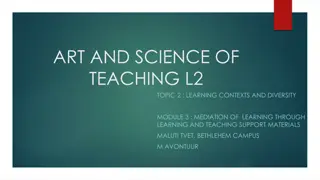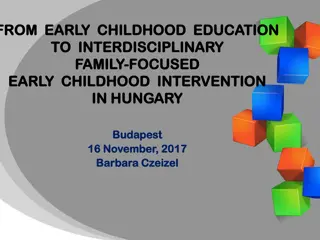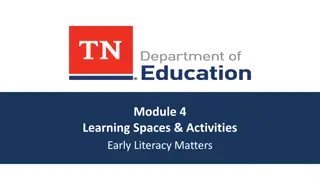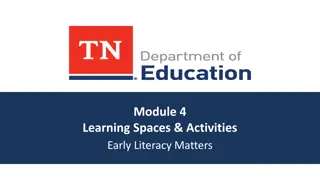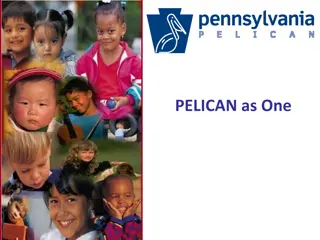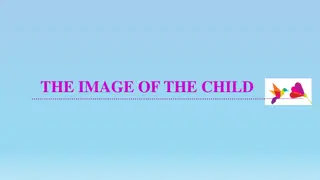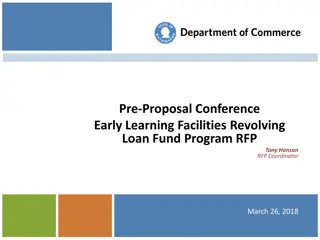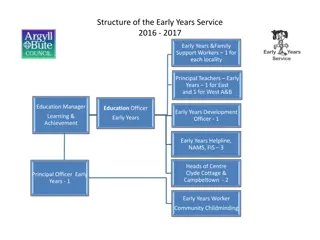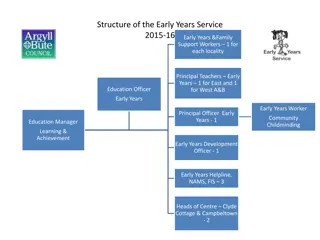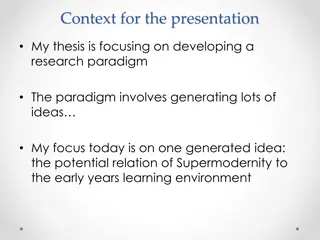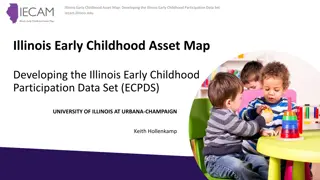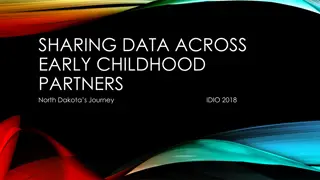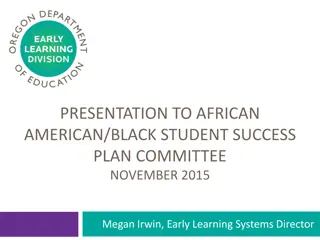Components of Effective Early Learning Environments
FLN Mission focuses on holistic learning in children, emphasizing early literacy and numeracy. The learning environment should cater to diverse needs, offering engaging materials and activities. Prior planning involves identifying children's developmental levels and adapting curriculum content. Methodologies should align with children's interests and abilities, promoting teacher-guided and child-initiated learning, use of technology, and seamless transitions.
Download Presentation

Please find below an Image/Link to download the presentation.
The content on the website is provided AS IS for your information and personal use only. It may not be sold, licensed, or shared on other websites without obtaining consent from the author.If you encounter any issues during the download, it is possible that the publisher has removed the file from their server.
You are allowed to download the files provided on this website for personal or commercial use, subject to the condition that they are used lawfully. All files are the property of their respective owners.
The content on the website is provided AS IS for your information and personal use only. It may not be sold, licensed, or shared on other websites without obtaining consent from the author.
E N D
Presentation Transcript
Major Aspects and Components of Teaching. Learning Process Learning Process Content
CONTENT Under FLN Mission, the focus lies on providing appropriate opportunities in early literacy and numeracy. With a focus on Language, Literacy and Numeracy, Learning and development in children is holistic and it advances in the areas of health, cognition, linguistic, personal, and social development and well-being simultaneously. Children learn in different ways, styles and at different pace.
The learning environment The learning environment should be designed according to the varied learning needs of learners. A classroom should have math/manipulative objects, puzzles, toys etc. for children. The classroom should provide children with the opportunities to engage in meaningful written expression. Materials such as drawing sheets, writing sheets, coloured pens, sketch pens, colours, pencils, white board and other writing resources should be made available to encourage children to write to express. A strong linkage of activities within classroom should be made with the experiences that children have at home. The activities conducted in school must continue at home in a friendly environment including parental engagement a print rich environment and
Prior Planning Prior Planning The following steps help the teachers to handle variations in early learning: Collect and select suitable range of toys and materials that enable learners and teachers to connect with listed concepts and skills for the age group of 3 to 9 years. Collect and plan activities for learners of varied contexts, according to their interest, abilities and needs, to keep them engaged and help them acquire meaningful and developmentally appropriate skills. Once the child is enrolled, their developmental level is to be identified to plan further strategies; this would help to carry out the early developmental screening of ALL children and identify their strengths. Early intervention minimizes learning difficulties and accelerates child development. The curriculum content then needs to be made flexible and accessible to children with different abilities
Methodology to adopt age and developmentally appropriate pedagogical practices. Based on children s interests, needs and abilities, following methodologies need to be considered; Teacher guided and child-initiated learning. Balance between concrete and abstract ideas Balance between teacher and learner s dialogue (teacher initiated and child initiated interaction) Connections with the child s previous knowledge Use and integration of technology in daily schedules. Use of open-ended materials to enhance thinking and questioning skills. Continuum in pedagogical practices from preschool to classes 1- 3(spiral lessons) Continuous observation of children s progress in foundational literacy and numeracy Connections with children s home language and daily experiences Smooth and seamless transitions from Pre-school, Balvatika and between classes 1-3.
Suggestive pedagogical processes for Suggestive pedagogical processes for achievement of learning outcomes achievement of learning outcomes Pedagogical processes are the strategies to be used by the teachers to transact the curriculum in such a way that learners learn by exploration, observation, investigation, expression, problem-solving and critical thinking to achieve the specified learning outcomes. Teachers need to align pedagogical practices, curriculum content, materials, and resources to achieve the desired learning outcomes. One of the especially important pedagogical practices is knowing and reviewing previous learning or knowledge of children. Then after selecting and planning the goal-oriented activities for achieving learning outcomes for literacy and numeracy, teacher may chalk out the monthly, weekly, and daily schedule. Thirdly, the environment of the classroom should be such that it is attractive and welcoming to every child, well equipped with age and developmentally appropriate variety of books and manipulatives; Further, there should be provision of sufficient time for children to practice each concept/skill, and continuous observation of how children are using the materials.
Planning Planning Activities Activities Prior planning and thoughtfully planned pedagogies to handle variations in early learning, work quite well. Teachers can plan these activities in a phased manner, proceeding from simple to complex, using the process indicators that would help in achieving the learning outcomes. Gradually, teachers should support the children s learning by progressively introducing new skills and knowledge. The kind of teaching instructions in the form of open-ended questions would help in knowing children and challenge children at the same time. Every teacher should know how to plan, execute, observe, and assess children s learning in foundational literacy and numeracy. Teachers must not hesitate to learn from one another and through exchange of ideas with cluster/block and other schools.
Teachers to provide Enabling Environment Teachers to provide Enabling Environment Teachers need to know the developmental characteristics of children, their individual learning styles and thereafter modify their teaching strategies. Pedagogical processes should consist of indigenous toys, materials, literacy, and mathematics related games that facilitate overall development. For example, movement games help to teach spatial sense, body coordination, sense of rhythm, vocabulary development and so on.
Teachers to provide Enabling Environment Teachers to provide Enabling Environment A good teacher would be friendly and interactive with all her/his learners, such as ask questions regarding their creation/activity individually to help them extend their thinking and encourage conversation. He/She should not be intrusive or directive in her approach, rather allow for learner s initiative and imagination to flourish and encourage them to express freely. Most importantly, the teacher must be encouraging and appreciative of each learner s efforts to give each learner a sense of confidence and boost their self-esteem. This would motivate them to come to school regularly and draw their attention towards learning.
Multiple Opportunities for Learning. Lots of opportunities for use of expressive and receptive language skills should be provided. Children need to be given opportunities to interact with adults and other children, to express themselves creatively and to communicate confidently. The small group interactions, read aloud, construction tasks in small groups, solving big puzzles in pairs are some of the proven strategies to improve communication skills, and increase the self-esteem of learners.
Multiple Opportunities for Learning These skills would help children to communicate ideas effectively, grasp the verbal information, listen to others, understand what other says, and thus develop and maintain relationship with their peers and adults. The read aloud and picture reading provide opportunities for learning new words, critical thinking skills etc. Asking questions are some of the especially important strategies to strengthen language and early literacy. When children engage in meaningful literacy activities with purposeful instruction, they develop listening, speaking, reading, and writing skills that enable them to be effective communicators.
Multiple Opportunities for Learning . To enhance mathematical thinking and scientific temper right from the beginning opportunities and a variety of experiences /activities for developing skills related thinking, reasoning, and analysing there should be ample to problem-solving, critical
Managing Varying Abilities Managing Varying Abilities: For pre-primary classes , the younger age group of children with emerging abilities can be engaged in free play, while the teacher conducts the guided activities with the older age group of children with higher abilities. After a period of 20 minutes, the teacher can conduct guided activities for the younger age group with emerging abilities while the older age group children are engaged in free play/activities.
Managing Varying Managing Varying Abilities. Abilities. Thus, the teacher will be able to manage the varying abilities and age groups through development appropriate activities. Here it is to be noted that this grouping is not meant for any kind of discrimination among children, but to facilitate learning and guide learners for smooth progress in literacy and numeracy learning. Another example is taking advantage of group meal time or small group play time where all children sit together and enjoy their lunch/play together. The teacher should utilise this time by encouraging good meal habits and work habits among learners, like eating food properly, how food tastes, throwing the fruit peels in the bin, putting away materials after playing, not dirtying the room, etc.
Areas to be focused upon while planning activities. All children from the age of 3 to 9 years are required to build on all their literacy and numeracy experiences and exposure to enhance their communication and mathematical process skills so that they can describe their experiences more effectively. It also needs to be ensured that all learners can receive and communicate information and develop higher order skills critical and creative thinking. This would help them to learn to read and write with comprehension that eventually enable them to solve the appropriate math problems using the process skills. This is the reason foundational literacy and numeracy must be seen as continuum from pre- school to class 3.
Considerations Considerations while planning and promoting the while planning and promoting the specific specific pedagogical practices for FLN pedagogical practices for FLN Model literate and mathematic behavior Intentional and guided practices/activities Listing of Process indicators for timely checks. Continuous Review and Reflection by the Teacher On the spot guidance by the educator/specialist Use of varied strategies for children of different abilities and interests. Use of varied indigenous toys, materials, and other resources to support the classroom plans and activities. Making good use of time and integrate FLN in daily schedules
Learning Enhancement Learning Enhancement Programme Programme Samagra Shiksha, Padhe Bharat Badhe Bharat (PBBB
